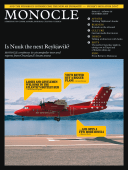
Issue 7
Is Nuuk the next Reykjavik? Monocle continues its circumpolar tour and reports from Greenland’s boom towns.
In This Issue
Oops! No content was found.
Looks like we no longer have content for the page you're on. Perhaps try a search?
Return Home

